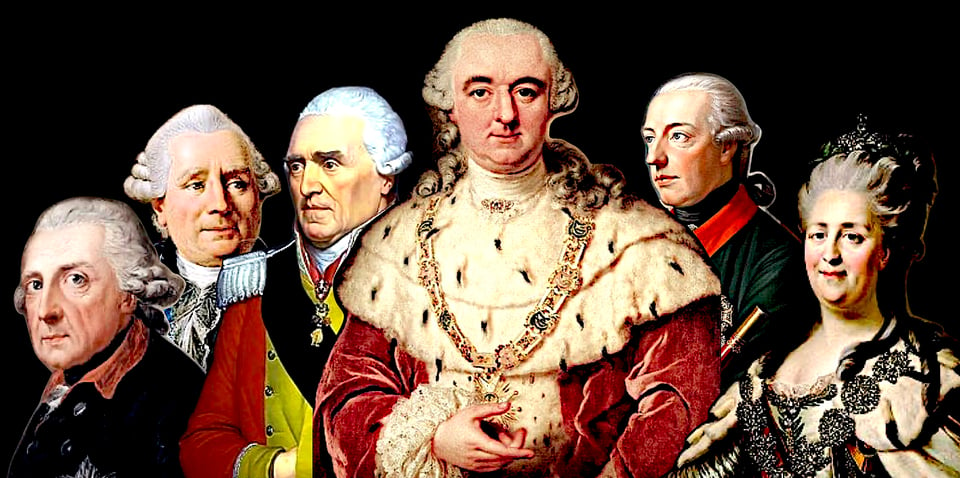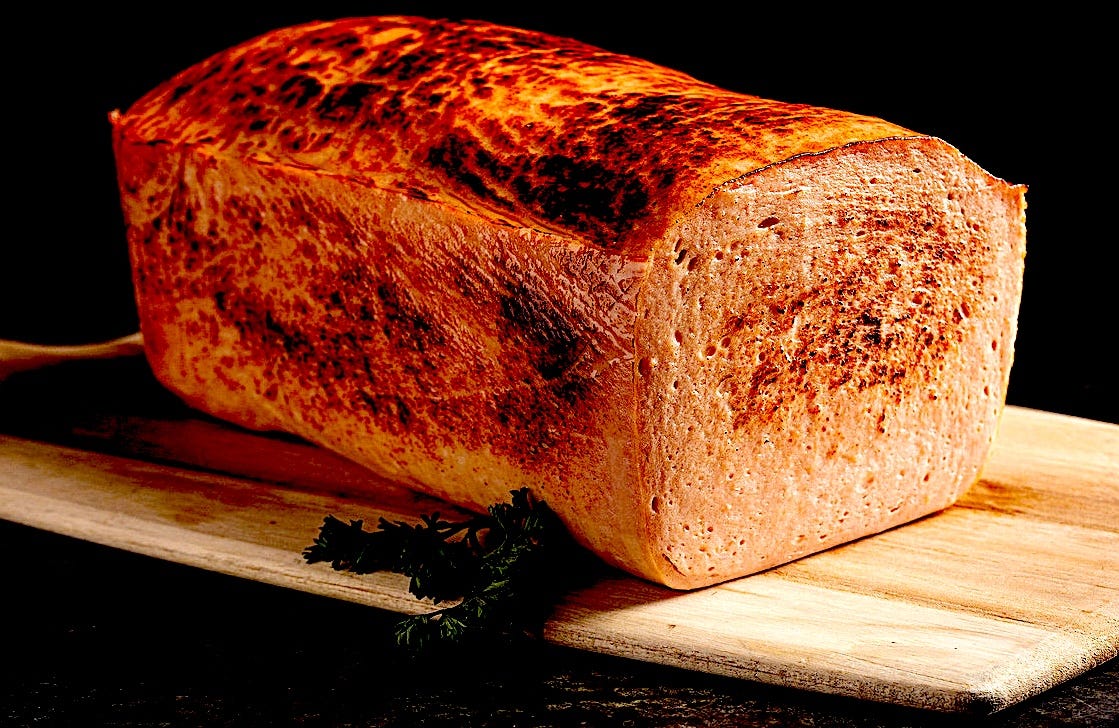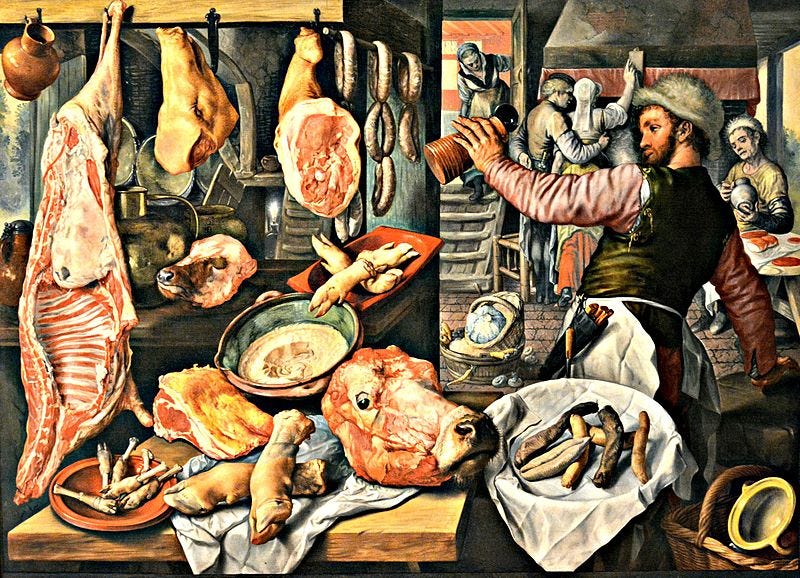Notable Sandwiches #106: Leberkäse

Welcome back to Notable Sandwiches, the feature where I, alongside my noble editor David Swanson, slough through the marshes of Wikipedia’s List of Notable Sandwiches, in alphabetical order. This week, a German and Austrian staple: Der Leberkäse.

Today, I look deep into the List of Sandwiches much like Tolkien’s great wizard Saruman gazes into his palantír, that cursed orb which seduces him by means of the evil images sent by Sauron of the flaming eye. And what looks back at me from the smooth marble of the list is a Bavarian sandwich whose name is literally translated as “liver cheese.”
I like liver! I like it a lot. But there’s only a tiny amount of liver in leberkäse—the majority is pork and veal—and no cheese at all, except in certain regional variants. (In most of Germany, leberkäse must legally contain some liver, so as not to be misleading. In Bavaria, land of its origin, “leberkäse” can be sold with no liver in it whatsoever, just pork, veal, or horse meat; the horse-meat version is more popular in Austria than Germany.) Visually, it’s pleasing: a caramelly crust, a rosy pink interior, an admirable distribution of fat. It’s usually served on a kaiser roll, or fried with an egg for breakfast.
It is also—like so many of our sandwiches—subject to culinary legend-making, maddeningly light on specifics. In this case, though, the legend has some toothsome details.
It starts like this: in the late eighteenth century, following the War of Bavarian Succession—a proxy war between a Saxon-Prussian alliance and the Habsburg Holy Roman Empire—Karl IV Theodor came to power in the newly combined territories of Bavaria and the Electoral Palatinate, a broad swath of territory in the Rhineland. The war was the last one in Europe that featured standing armies arrayed in splendor on the battlefield. It was also mostly waged through diplomacy, although thousands of soldiers died of starvation and disease in the field, leading it to be called the “Potato War” in Germany and the “Plum Fuss” in Habsburg Austria.
Bear with me. Stare too long into the palantír, and you begin to go insane. Join me in the flaming eye of weird meat knowledge.

The irony of it all is that Karl Theodor didn’t care for the Bavarian holdings all that much, and a big driver of the whole war was his eagerness to cede parts of it to Joseph II, Holy Roman Emperor and Arch-Habsburg, thus mightily pissing off Frederick the Great, King of Prussia. Karl Theodor was perfectly content in the Palatinate, where he ruled, in decadent and blowsy fashion, over a court that valued art, music and philosophy. Ultimately, he commissioned a dramatic opera from Mozart featuring a sea monster, poached Voltaire’s private secretary, fathered a whole clutch of bastards, and kept ennobling his French mistresses into countesses.
Scottish essayist Thomas Carlyle called Karl Theodor a “poor idle creature, of purely egoistical, ornamental, dilettante nature; sunk in theatricals, bastard children and the like,” while French foreign minister Charles Gravier judged that “the void which this indolence has left in his soul is filled with the amusements of the hunt and of music and by secret liaisons.” While Prince-Elector of the Palatinate, before the whole Bavarian succession mess, he lived in the absolutely beautiful Schwetzingen Palace. It’s stunning! There’s art everywhere! The gardens are magnificent! There are absolutely so many baroque nooks and crannies to bone French actresses in!
Speaking of bones, Wolfgang Weissman, assistant to the curator at Schloss Schwetzingen, told me that Karl Theodor and his court so loved meat that they had a slaughterhouse built on the premises, and used the bones to fertilize the gardens. So this louche aristo did not want to live in Munich (Nymphenburg Palace being insufficiently opulent for him or whatever, which is insane), or Bavaria in general( which was apparently too much of a backwater for the guy who employed Voltaire’s very own private secretary). So he tried to broker a deal to trade all of Bavaria for the Austrian Netherlands. It failed.
The Sword and the Sandwich is a newsletter about deadly serious extremism and serious sandwiches. Please consider supporting this work with
a paid subscription.
This attitude, understandably, pissed off Karl Theodor’s Bavarian subjects quite a bit, a development which compelled him to relocate to Munich… taking with him a master butcher, who invented leberkäse as a court delicacy. Or so we are told—in every available modern source about the leberkäse.
But as I gaze deeper into the palantír and my eyes get perceptibly crazier, I begin to smell not the delectable aroma of meatloaf, but the far more pungent odor of… bullshit. “This whole thing reeks of folk etymology!” I shout. Clue one: the master butcher’s name is exceedingly difficult to find—even in German newspapers from the nineteenth century. Or the twentieth. Or twenty-first, for that matter. It might just be a Plum Fuss of its own.
I’ve been on a full wild-eyed fact-checker quest on this one, and let me tell you this: any iteration of Googling “German butcher” will bring you a whole lot of fucked-up stuff, none of it relevant to the sandwich at hand. “I have never heard the name of a butcher in Karl Theodor’s court,” Herr Weissman told me, in sibilant, somewhat disappointed tones. “I don’t think that we know a name.”
The Unnamed Butcher strikes me as a ghost in the meat-processing machine, a desperate attempt to explain away the fact that something called leberkäse contains neither liver nor cheese. According to the Mittelbayerische Zeitung, the premier newspaper of central Bavaria since 1945, there are two dueling theories about the origins of the name “leberkäse.” Ludwig Zehetner, winner of the 2023 Bavarian Dialect Prize, gives a simple theory about the word’s etymology. “The part of the word Leber developed from Loabi or Laib, like a loaf of bread,” the newspaper paraphrases Zehetner. “And a Kas or Käs is an edible mass.” A loaf of edible mass. Just like mutter used to make.

But, of course, there’s a second theory. This is where the ghost butcher comes in. According to a lokalpatriotische (locally patriotic! This is a great word) theory, the reason leberkäse is named leberkäse is due to a mistranslation between the Palatinate and Bavarian dialects of German. “The butcher in question was of course speaking in the Palatinate dialect, and ‘Laib Kas’ sounds like ‘Lääba Käs,’" the Zeitung explains. Ergo, “leberkäse.” Now, I am not familiar with the eighteenth-century Palatine dialect, but this feels… too convenient. When I emailed him, Profesor Zehetner replied that he “didn’t have any new information” about the etymology of the leberkäse. “The Mannheim theory sounds good,” he wrote. “But is it more than folklore?”
An excellent question, Herr Doktor. Is this just Mannheim boosters steamrolling us? A Munich putsch (not of the Beer Hall variety)? One rule of thumb when fact-checking is if you can’t find a primary source anywhere—not in cookbooks or newspapers or websites, and there are no courtiers’ letters or contemporaneous recipes—you might be dealing with a legend. For one thing, contemporary royal chefs (and presumably master butchers) were hardly reticent figures.
In fact, some were super famous. Paul Tremo, the French-Huguenot chef to King Stanislaus Augustus Poniatowski of Poland from 1762 to 1798, pioneered French-Polish fusion cuisine, mentored generations of budding culinarians, and was famous for both his larded hazel grouse and his motto “not everyone thinks, but everyone eats.” Frederick the Great composed a 132-verse ode to his personal chef André Noël in 1772, honoring him for creating, among other dishes, the bombe de Sardanapale, a head of cabbage stuffed with olives, capers, bacon, garlic, spicy meat, saffron and so many other “fine ingredients” a French philosopher purportedly died after overindulging in it. All of this is extremely well-attested-to in contemporary memoirs and letters.

Which brings us back to the ghost butcher: a man so famous he bequeathed Germany and Austria with one of its most beloved dishes—yet whose name is, somehow, lost to time. A ghost fact, in other words. A Plum Fuss, a potato war, a piece of convenient provincial nonsense. Because if a dish is this beloved—it has long since escaped the borders of Bavaria and gone on to conquer the Germanic palate writ large—and everybody knows the specific guy who invented it, YOU WOULD KNOW THAT GUY’S NAME. RIGHT? This is one of the iron laws of local patriotism! Like, I am totally psyched that Marc Jacobs is from my hometown, even though I could never afford his two thousand dollar leather bubble dress! I am doubting the lokalpatriotische spirit of Mannheim… unless it has led its food historians into the realm of Unacceptable Tomfoolery.
(I’ve been staring into the palantír for hours now. The swirling, majestic orb keeps calling my name, telling me to go deeper. I learned that Karl Theodor banned the Illuminati in Bavaria, as well as a lot of religious holidays, but he also significantly increased salt mining production, and a brine spring is named after him.)
To test my “ghost butcher” theory, I waited until 9am German time and reached out to various people at:
The Schwetzingen Palace, where Karl Theodor lived until that bummer war, presumably with his butcher
The Nymphenburg Palace, where Karl Theodor took his butcher and where the leberkäse was purportedly invented
The House of Bavarian History in Regensburg
The Department of Bavarian History at the Ludwig-Maximilians-Universität München
The Bayerisches Nationalmuseum in Munich
And so on.
I talked to a bunch of bemused but very nice Germans, except for the guy at the Bayerisches Nationalmuseum who yelled at me for not speaking Deutsch. No one knew the ghost butcher’s name, although I see in hindsight that this was a big request on short notice. And also that Germans actually take vacations in the summertime.
But August notwithstanding, I eventually struck gold, in the person of Anja Lochbrunner at the Bayerische Akademie der Wissenschaften, who has pored over legions of court records to document Karl Theodor's transition from Mannheim to Munich in 1778. "What I can tell you is that I found records of two butchers at Karl Theodor's court in Munich. Their names were Sebastian Hofmann and Johann Seyfried. Both were hired by the court of Munich before Karl Theodor took the reign in Bavaria in 1778 (not 1776, as stated by some of the accounts I read!), though. It seems that there was no court butcher at Karl Theodor's previous court in Mannheim, at least not an official one. If there is truth to the story, I suppose one of the Bavarian butchers may have invented Leberkäse for the Elector or else it could have been one of the cooks in the court kitchen who took the butcher's meat and created the recipe. Among others, there were 11 cooks Karl Theodor had brought with him from the Palatinate."
"It is a matter of lower court staff or staff whose business acted as a purveyor to the court, which is mentioned by name in the salary lists or the court almanacs of the Electoral Palatinate court with an address in the city,” says Prof. Dr. Susan Richter, who just published Amo te Solo, a book of love letters between Karl Theodor's wife and her brother-in-law. “However, specific products are not listed in either of these sources. I have just looked again at the French letters from Karl Theodor's wife, Elisaberh Augusta, to her brother-in-law (and lover) in Munich, Duke Clemens Franz, which I recently edited. She doesn't mention leberkäse—neither in Mannheim nor in Munich. But I have another idea: I have contacted a colleague who is researching Elisabeth Charlotte, a Palatine princess who became the sister-in-law of Louis XIV, the Sun King in Versailles in the 17th century. She often complained about the French cuisine at court and longed for the Palatinate specialties—sauerkraut, for example. The Duke of Württemberg brought her some when he visited France. It could perhaps also have included leberkäse."
"For the court kitchen, a Mannheim master butcher was also in the electoral entourage,” says the Mittelbayerische Zeitung. “His name is not handed down, but the incontrovertible fact that he is the inventor of the Bavarian leberkäs."
I've heard enough. I'm calling it. The master butcher is a ghost, a fiction. He never was, and leberkäse has another story, somewhere lost under this boosterish myth. Somewhere between the meat and the kaiser roll is the truth; I have chased the lie and found it wanting. But I got to learn so much. And that’s my favorite part: all that knowledge pummeled and sliced and ground through the meat-sieve of my mind and served to you hot and fresh on a semmel roll. That’s worth a Plum Fuss or two.

-
What thorough and joyful scholarship. One of my favorites so far!
-
"A Bavarian is a cross between an Austrian and a man."--Prince Otto von Bismarck
-
🤎
-
oh for petesake. sorry about all the hearts. my phone and the buttondown UI are not playing nice today
-
But where is the actual sandwich? Just leberkase on kaiser roll? That's it?
-
I love leberkase and was very entertained by this mythical/history lesson around it! Thank you!
-
Another joyous excursion into sandwich-dom. After reading this and doing a little bit of research (not nearly as mochas you did) I discovered this is similar to a cold cut I get here in Vancouver and like very, very much: Bavarian meatloaf.
-
Thank you! Born in Mannheim, living in Munich on a Leberkäs diet I had no idea. You made my day!
Add a comment: